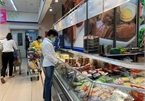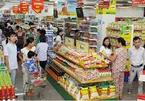When Covid-19 broke out, marketplaces, for example, saw a sharp increase in the demand for face masks and hand washing liquid.

At Tiki, the number of orders have sometimes reached 4,000 a minute. According to Ngo Hoang Gia Khanh from Tiki JSC, in the first week alone, the number of face masks sold increased by 8 times and the number of hand washing products by 10 times. The sales have grown by 15 percent since February compared with the end of 2019.
At Lazada, the demand for room spray and disinfection items has increased by 160 percent, for diapers and toilet paper over 60 percent and canned food and packaged food by 50 percent.
| Because of the pandemic, people have hesitated to go to crowded places and have increasingly bought many items online. |
Supermarkets have also reported significant increase in online sales.
A representative of Saigon Co-op said on the day when the 17th case was discovered in Vietnam, the number of online orders increased by 10 times. To date, the number of customers buying things online and via telephone has increased by 4-5 times.
The number of online orders at SpeedL, belonging to Lotte Mart, has increased by 150-200 percent since the outbreak.
Big C reported that on March 1-12, the supermarkets of the chain completed more than 1,000 orders via telephone. The chain expects to have 3,000 orders in March, a 200 percent increase compared with February.
According to Nguyen Ba Diep, deputy chair of MoMo e-wallet, the number of transactions via e-wallet has increased by 100 percent since early February, while the value of transactions has increased by 50-100 percent because customers tend to buy many things at the same time.
A survey by Nielsen Vietnam found that Vietnamese people think traditional markets and supermarkets are the places where coronavirus will spread. Therefore, they would rather stay at home and shop on the internet.
Of 500 people interviewed by Nielsen and Infocus Mekong Mobile Panel in HCM City, Hanoi and Da Nang, more than half said they reduced the frequency of going to supermarkets and groceries, while the figure is 60 percent for traditional markets.
Twenty five percent of consumers have increased online shopping and reduced offline shopping. Meanwhile, 45 percent said they are storing more food at home than previously.
The Domestic Market Department of the Ministry of Industry and Trade reported that the purchasing power at traditional markets had fallen by 20-30 percent.
At least 47 percent of polled people said they have changed their eating habits, while 60 percent have changed entertainment methods and 70 percent have reconsidered tourism plans.
Mai Lan

Vietnam retail industry face difficulties during COVID-19
Many businesses have been forced to implement social distancing rules due to the COVID-19 outbreak, and the retail sector has been hit hard.

Vietnamese businesses led retailers’ game in 2019
Many M&A deals in the retail market were made in 2019, but unlike previous years, Vietnamese groups ‘conducted the choir’.
 Because of the pandemic, people have hesitated to go to crowded places and have increasingly bought many items online.
Because of the pandemic, people have hesitated to go to crowded places and have increasingly bought many items online.